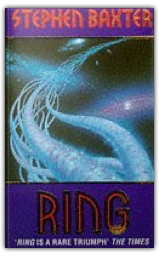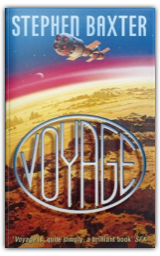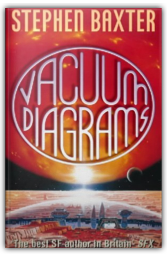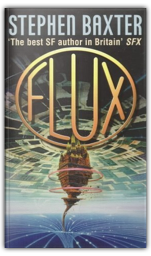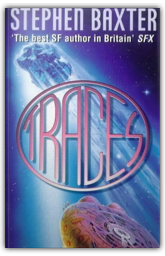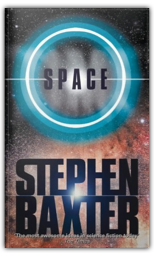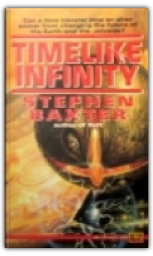 Timelike Infinity
Stephen Baxter
Timelike Infinity
Stephen Baxter
Pursued by the Qax and their great, sentient ships, a band of rebels escapes into the past, where they find allies from fifteen hundred years ago. 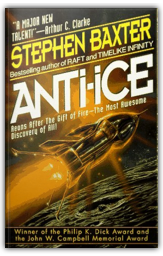 Anti-Ice
Stephen Baxter
Anti-Ice
Stephen Baxter
Discovering a new element, Anti-Ice, a mysterious substance that unleashes vast energies when warmed, a millionaire industrialist dreams of power from an item that promises world peace—or world destruction. 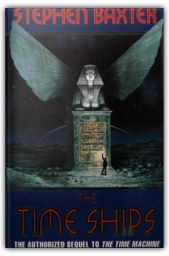 The Time Ships
Stephen Baxter
The Time Ships
Stephen Baxter
What if the time machine from H.G. Wells' classic novel of the same name had fallen into government hands? That's the question that led Stephen Baxter to create this modern-day sequel, which combines a basic Wellsian premise with a Baxteresque universe-spanning epic. The Time Traveller, driven by his failure to save Weena from the Morlocks, sets off again for the future. But this time the future has changed, altered by the very tale of the Traveller's previous journey. 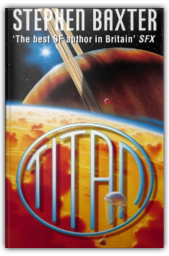 Titan
Stephen Baxter
Titan
Stephen Baxter
Take some archetypal sci-fi characters (ageing moonwalker, several bright young astronauts and a dedicated but reclusive scientist), throw in the near future scenario of a declining space programme following a catastrophic fatal accident, mix well with some unusual plot twists and you have the foundations for Baxter's eighth novel. 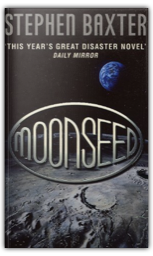 Moonseed
Stephen Baxter
Moonseed
Stephen Baxter
Stephen Baxter established himself as a major British sci-fi author with tales of exotic, far-future technology. More recently, in Voyage, Titan and now Moonseed, he shows his love for the hardware of the real world's space programme. (Comparisons with Tom Wolfe's The Right Stuff have been frequent.) Moonseed is a spectacular disaster novel whose threat to Earth comes from a long-forgotten Moon rock sample carrying strange silver dust that seems to be alien nanotechnology— molecule-sized machines. Accidentally spilt in Edinburgh, this "Moonseed" quietly devours stone and processes it into more Moonseed. Geology becomes high drama: when ancient mountains turn to dust, the lid is taken off seething magma below. Volcanoes return to Scotland, and Krakatoa-like eruptions spread Moonseed around the world. A desperate, improvised US/Russian space mission heads for the Moon to probe the secret of how our satellite has survived uneaten. Baxter convincingly shows how travel costs could be cut, with a hair-raising descent on a shoestring lunar lander that makes Apollo's look like a luxury craft. The climax brings literally world-shaking revelations and upheavals. Moonseed is a ripping interplanetary yarn. — David Langford 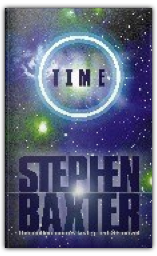 Time
Stephen Baxter
Time
Stephen Baxter
Stephen Baxter, Britain's foremost author of "hard" SF rooted in real physics, is renowned for thinking big. Time begins with a US entrepreneur's deceptively low-key plans to reclaim space and exploit the asteroids, bypassing NASA's bureaucracy and safety regulations. One bizarre cost-cutting measure: the "Big Dumb Booster" pilot is a genetically enhanced, intelligent squid. Then the mission is redirected following a weird mathematical prediction that humanity hasn't long to live, and a "Feynman radio" transmission from the future that highlights a particular asteroid. Here a space-time gateway opens on unimaginably distant futures, stepping far beyond the dying sun of Wells's The Time Machine to visions of a galaxy reshaped by humanity to hoard its energy ... beyond stars, beyond black holes, beyond even mass. And the emerging message, seen most clearly by a new generation of persecuted, ultra-gifted children, is that this seeming triumph—this total exploitation of our universe's possibilities—isn—isn't good enough. A better path awaits, via a cataclysm that dwarfs mere supernova explosions... Baxter pays homage to the transformations of Clarke's Childhood's End (there's also a nod to 2001), but without the mysticism: it's all respectable, if speculative, physics. His final, devastating payoff makes sequels seem impossible. Two are planned. Rousing stuff, on a cosmic scale. —David Langford |
 Made with Delicious Library
Made with Delicious Library
London, State zipflap congrotus delicious library Scott, Mike




